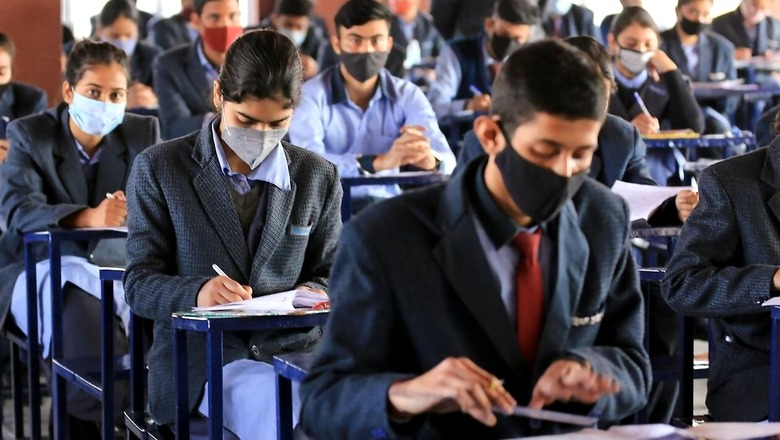
views
As students are now gearing up to face CBSE board exams term II with full strength, it is crucial to chart out a strategic and smart road map to manage stress and prepare for the examination. With a new method of testing and assessments from the erstwhile patterns and practices, it becomes important for students to adapt to a well-structured approach towards preparations. They must practice for the exams in order to confidently approach it. Especially since, it will be a maiden attempt. Here are a few tips to help students in self-preparation.
Stop thinking and relax
Before you begin with your exam, relax, stop thinking for two minutes and let calmness take over your body and mind. This will enrich and energize your brain to approach the task wisely. You need to seriously practice this at home a couple of times, particularly in the case of core and challenging subjects. Few minutes of daily meditation can actually help in strengthening the body, mind and soul.
Read | Will CBSE, CISCE Term 2 Exams be Canceled Due to Rise in Covid-19 Cases? What do Rules Say, What Students Demand?
Chalk out a strategy
Calculated and informed approach for exams will help in getting an extra edge and confidence. Exam days are considered as the toughest phase in the learner’s academic pursuit, so it helps in being prepared. Preparation for the exam essentially starts with thorough reading and understanding of prescribed syllabus.
Focusing on the writing skills and effective presentation of answers, emphasizing on the neatness in work. Practicing multiple times with previous questions of same pattern, marks distribution and difficulty levels helps tremendously.
Also read| CBSE 10th, 12th Final Result 2022 Likely to Give More Weightage Term 2 Exams
Create a study plan to manage time for all the subjects, attempt multiple mock tests, group studies, doing a reverse strategy of attempting questions carrying high marks, avoid usage of gadgets and other distractions during study holidays, take a healthy diet and proper sleep etc. are some of the non-negotiables and known things.
Read the question paper
Always read the question paper thoroughly as the brain works on the subconscious level continuously. Divide time wisely for the test. Stay focused on the question at hand. Formulate the answers point wise in your mind before putting the pen to paper.
Subjective answers should begin with a short introduction or background, followed by elaboration of the main points and end with a conclusion or summary. Elaborate on the points according to weightage of marks. Review your answer and give examples wherever required and possible.
For example, in English: for reading skills, scan and skim the comprehension passage and for writing skills revise format, layout and content. For report writing, stick to the format, practice all the varieties, keep the content coherent and synchronized. For literature, be mindful about the mood, writing style, literary devices and tone of the author. Use simple words. Complicated and sophisticated vocabulary could cost you marks.
Skip the tough questions momentarily, don’t lose the momentum of writing the exam. Keep them for the end and jump to questions you know, ones you are confident about answering. Answering them will give you confidence that will help you in writing answers for the ones you skipped. Read the questions and cater to the demand of the question. Neither write less than what is needed nor more than what is required in the question.
Tips for paper writing
Generally writing 6 to 7 words per line and 16 to 17 lines in a page with a little less than 1 inch margin on all four sides of your answer sheets would be around 100 words per page. This way, you can easily estimate the quantum of writing skills and capacity one should generate and build through practice at home prior to the exams. Keep in mind the word limit of each question, especially wherever instructed.
Underline the key words so that when the answer booklets are checked the key words are legibly visible and prominent to catch the attention of the evaluators. These would give you the advantage to fetch more marks.
Never leave any questions unattended. You can keep few difficult questions for the end but don’t completely avoid answering them. At least write some points to address them.
Read| CBSE Board Exam 2022: Rise in COVID Cases, Students Demand Board to Hold Exams At Home Centres
Leave few lines after answers for each question so that while revising your answers, if you feel a line or two should have been added, you can do that in the space you left. It is advised to structure the answers for questions in your head or make a rough work column and just write small notes – what should come first and what should come after, that is, the sequence of the answer. This would help you write the answers in a well-structured and coherent manner.
The language of answer should be simple and not very fancy or complicated that the examiner finds it easy to understand your thoughts and evaluate the paper accordingly. Time management is vital. Allot specific time for each section and keep 10-15 minutes as buffer time at the end.
— Authored by Dr Mala Kapoor, Principal, Silverline Prestige School, Ghaziabad
Read all the Latest Education News here




















Comments
0 comment